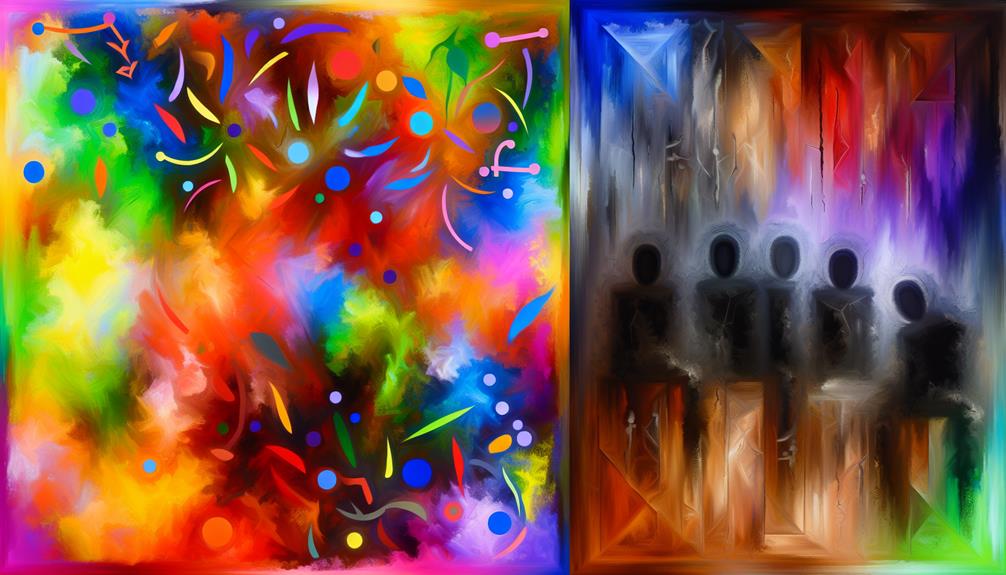You might not realize that a person with bipolar disorder can experience two vastly different cognitive landscapes depending on their mood state. During manic phases, thoughts race and impulsivity can lead to seemingly irrational decisions, while depressive episodes may evoke paralyzing self-doubt and negativity. These fluctuations not only shape their internal dialogue but also complicate relationships with others. Understanding these patterns is essential, as it opens the door to deeper insights about the emotional turmoil and resilience that often accompany bipolar thinking. What might you discover about the strengths hidden within these challenges?
Contents
Understanding Bipolar Disorder
Bipolar disorder, often misunderstood, affects millions of people around the world, and recognizing its nuances is essential for both those living with it and their loved ones. You might experience notable mood fluctuations, swinging between periods of extreme highs (mania) and lows (depression). These shifts can be influenced by neurobiological factors that alter your brain chemistry, making it imperative to understand the underlying science behind the condition.
Social stigma surrounding bipolar disorder can make it challenging to discuss your experiences openly. This stigma often perpetuates misunderstandings, leading to isolation and feelings of shame. However, it's important to know that you're not alone, and there are treatment options available to help manage your symptoms. Medications, therapy, and lifestyle adjustments can play an essential role in your emotional regulation.
Building strong support systems is equally important. Friends, family, and mental health professionals can provide the understanding and encouragement you need. Developing self-awareness about your triggers and recognizing the early signs of mood changes can empower you to take proactive steps in managing your disorder.
Implementing lifestyle adjustments, such as regular exercise, a balanced diet, and consistent sleep patterns, can greatly enhance your overall well-being. By focusing on these aspects, you can create a more stable environment that minimizes the severity of mood fluctuations. Remember, understanding bipolar disorder is a journey, and with the right tools and support, you can navigate it more effectively.
Cognitive Patterns in Mania
During manic episodes, you'll likely notice distinct cognitive patterns that can considerably impact your thoughts and behaviors. This phase is characterized by elevated mood, heightened energy, and euphoric states. However, it often comes with racing thoughts and impulsive behavior that can lead to poor decision-making. You might find yourself experiencing grandiose ideas, believing you can accomplish almost anything, which can skew your perception of reality.
Here's a breakdown of some cognitive patterns you might recognize during these episodes:
| Cognitive Pattern | Description | Potential Impact |
|---|---|---|
| Racing Thoughts | Rapid, often chaotic flow of ideas and thoughts | Difficulty concentrating |
| Grandiose Ideas | Overestimation of abilities and self-worth | Can lead to risky ventures |
| Impulsive Behavior | Acting without thinking about consequences | Increased likelihood of regret or harm |
You may also notice a decreased need for sleep, which can feel energizing at first but may ultimately exacerbate distractibility issues. Your altered perception can make everyday situations seem extraordinary, fueling your drive to pursue new experiences. While these cognitive patterns can feel exhilarating, they can also lead to challenges in relationships and personal safety. Recognizing these patterns can help you navigate your experiences more effectively and seek support when needed. Understanding how mania affects your thinking is a key step in managing bipolar disorder and maintaining stability.
Thought Processes During Depression

When grappling with a depressive episode, it's common for your thought processes to become clouded and distorted, impacting how you perceive yourself and the world around you. You might find yourself caught in negative self-talk, where every thought seems to reinforce feelings of inadequacy. This self-criticism can spiral into rumination cycles, making it difficult to break free from the relentless focus on perceived failures.
During these times, hopelessness feelings can creep in, distorting your perception of the future. Cognitive distortions might lead you to think that things will never improve, amplifying withdrawal tendencies that push you further into isolation. The fatigue effects of depression can make even the simplest tasks feel monumental, contributing to a significant loss of motivation. As you withdraw from social interactions, the isolation impacts can deepen your despair, creating an echo chamber for those negative thoughts.
You may also notice a shift in perception where you view situations through a lens of defeat, believing you're destined for failure. This can make it tough to see any glimmers of hope or potential for change. Understanding these thought processes is vital, as it allows you to recognize when you're trapped in these patterns. By acknowledging the cognitive distortions and their effects, you can begin to challenge these thoughts, fostering a path toward healing and connection with others. Remember, it's okay to seek help when these feelings become overwhelming.
Impact on Decision-Making
Charting the tumultuous waters of bipolar thinking can considerably impact your decision-making abilities. When you're experiencing a manic phase, impulsivity issues often take center stage. You might find yourself making snap decisions without weighing the consequences, which can lead to risky behaviors—like overspending, reckless driving, or unplanned travel. These choices may seem thrilling in the moment, but they can have lasting repercussions on your life and relationships.
During depressive episodes, on the other hand, your decision-making process can become paralyzed by negativity and hopelessness. You might struggle to make even simple choices, feeling overwhelmed by the fear of failure or the weight of indecision. This can lead to missed opportunities or a tendency to withdraw from situations altogether.
Risk assessment becomes tricky in both phases. In mania, you may underestimate risks or entirely dismiss them, while in depression, you might overestimate potential dangers, opting for avoidance instead. This inconsistency can leave you feeling trapped in a cycle of poor decisions and regret.
Understanding these patterns is essential. By recognizing when your impulsivity issues or risk assessment skills are compromised, you can implement strategies to mitigate their effects. Seeking support from friends, family, or mental health professionals can also help you navigate these turbulent waters and promote healthier decision-making habits. It's about finding balance and making choices that reflect your true values, rather than the extremes of bipolar thinking.
Emotional Responses and Relationships

The way you experience emotions can considerably affect your relationships, especially in the context of bipolar thinking. Your emotional triggers can lead to intense mood fluctuations, which may create unique relationship dynamics. At times, you might feel deeply connected and empathetic, while at other moments, you may struggle with intimacy or face communication challenges. These fluctuations can leave your loved ones confused and unsure about how to support you effectively.
Trust issues often arise as your partners or friends may find it hard to predict your emotional state. This unpredictability can complicate conflict resolution, as your responses might be more intense than the situation warrants. Boundary setting becomes essential; without clear boundaries, emotional overwhelm can lead to further strain in your relationships.
It's vital to cultivate a support system that understands your experience. They can help you navigate the complexities of your emotions and provide a safe space for open dialogue. However, even with a strong support network, empathy levels can fluctuate, impacting how you relate to others.
Recognizing these patterns can help you manage emotional responses and foster healthier relationships. Understanding the interplay between your mood fluctuations and relational dynamics paves the way for more effective communication. By acknowledging your struggles with intimacy and emotional triggers, you can work towards building deeper connections and enhancing your overall relational well-being.
Coping Mechanisms and Strategies
Coping with bipolar thinking can feel overwhelming, but there are effective strategies you can adopt to navigate the emotional ups and downs. It's essential to develop coping skills that resonate with you personally. Mindfulness techniques, for instance, can help you stay grounded during intense emotional shifts. Practicing mindfulness encourages you to focus on the present, reducing anxiety and promoting emotional regulation.
Incorporating self-care practices into your daily routine is another important strategy. This can include:
- Routine building: Establish a consistent daily schedule that includes time for self-care, work, and relaxation.
- Support networks: Surround yourself with people who understand your experiences, whether they're friends, family, or support groups.
- Therapy options: Engaging in therapy can provide you with tools and insights to manage your condition more effectively.
Lifestyle adjustments, such as regular exercise, balanced nutrition, and adequate sleep, can also play a significant role in stabilizing your mood. Medication management is often a part of this journey, so working closely with your healthcare provider is essential.
Don't underestimate the power of stress reduction techniques, whether it's through yoga, meditation, or simply taking time for hobbies you enjoy. By combining these strategies, you can create a flexible framework that not only helps you cope with bipolar thinking but also encourages a more fulfilling and balanced life. Remember, you're not alone in this journey, and finding what works best for you may take time and experimentation.
The Strengths of Bipolar Thinking

When you think about bipolar thinking, it's crucial to recognize the unique strengths it brings. Your ability to creatively solve problems, coupled with heightened emotional awareness, often allows for deeper insights and connections. Plus, facing challenges can foster resilience, enabling you to navigate life's ups and downs with remarkable grit.
Creative Problem Solving
Tapping into the unique strengths of bipolar thinking can open up new avenues for creative problem solving. Those with bipolar tendencies often exhibit a flexible mindset and exceptional abstract reasoning, enabling them to approach challenges from various angles. This ability to engage in divergent thinking allows for spontaneous ideas and imaginative solutions that others might overlook.
Here are a few strengths that can enhance creative problem solving:
- Innovative approaches: You're likely to see connections between seemingly unrelated concepts, leading to fresh perspectives.
- Risk-taking behavior: Your willingness to venture into the unknown can result in breakthroughs that might intimidate others.
- Creative insights: Those moments of inspiration can spark unique solutions that defy conventional thought.
Heightened Emotional Awareness
Building on the unique strengths that come with bipolar thinking, heightened emotional awareness stands out as a significant asset. You might find that your ability to perceive and process emotions is more intense than others. This heightened awareness can foster deeper connections with those around you, allowing for profound empathy development. You're often able to sense what others are feeling, even when they don't express it directly, making you a supportive friend or partner.
However, this emotional sensitivity can be a double-edged sword. While it enhances your relationships, it can also lead to challenges in emotional regulation. You might experience overwhelming feelings, making it difficult to manage your reactions during emotional highs or lows. Recognizing this, you can work on strategies to balance your emotional landscape. Mindfulness practices or therapeutic techniques can help you harness your emotional insights while maintaining stability.
Ultimately, your heightened emotional awareness can be a powerful tool. By learning to navigate the complexities of your emotions, you can channel this strength into building empathy and understanding, enriching both your life and the lives of those around you.
Resilience Through Challenges
Maneuvering the ups and downs of bipolar thinking often reveals a remarkable resilience that can emerge through challenges. You might find that these experiences foster an emotional fortitude that not only helps you cope but also promotes growth. Embracing a growth mindset can transform your perspective on adaptive challenges, allowing you to view hurdles as opportunities for personal growth.
In this journey, it's essential to cultivate mindful resilience and engage in self-compassion practices. Surrounding yourself with supportive environments and nurturing community connections can enhance your healing journey, making it easier to share your personal narratives.
- Embrace transformative experiences: Each challenge can reveal new strengths and insights.
- Practice self-compassion: Forgive yourself for setbacks; they're part of your path.
- Build community connections: Sharing your experiences can foster understanding and support.
Frequently Asked Questions
Can Bipolar Disorder Affect Memory and Concentration?
Yes, bipolar disorder can affect your memory and concentration. You might experience memory challenges and concentration difficulties during mood episodes, making it hard to focus and retain information. Understanding this can help in managing symptoms effectively.
How Does Bipolar Disorder Influence Creativity?
Ever wondered how emotions can fuel creativity? In bipolar disorder, heightened emotional expression often sparks unique ideas and artistic breakthroughs, allowing you to tap into a rich well of creativity that others might overlook.
Is Bipolar Disorder Hereditary?
Yes, bipolar disorder can be hereditary. You might notice familial patterns indicating a genetic predisposition. If you have relatives with the condition, it is crucial to understand how this may affect your own mental health journey.
Can Lifestyle Changes Improve Bipolar Symptoms?
Studies show that nearly 40% of individuals with bipolar disorder experience symptom improvement through lifestyle changes. By adopting dietary changes and consistent exercise routines, you can greatly enhance your overall well-being and stabilize your mood more effectively.
What Role Does Therapy Play in Bipolar Management?
Therapy plays a vital role in managing bipolar disorder. It helps you explore therapy techniques and fosters a therapeutic relationship, providing support and coping strategies. This process enhances self-awareness and emotional regulation, ultimately improving your overall well-being.
Conclusion
In steering through the tumultuous seas of bipolar disorder, you may find that your thoughts ebb and flow like the tides. Embracing both the highs and lows can reveal a unique perspective, rich with creativity and depth. By harnessing effective coping strategies and nurturing strong relationships, you can transform the stormy weather of your mind into a canvas of resilience. Remember, every wave has its purpose, and within the chaos, you hold the power to cultivate understanding and strength.
